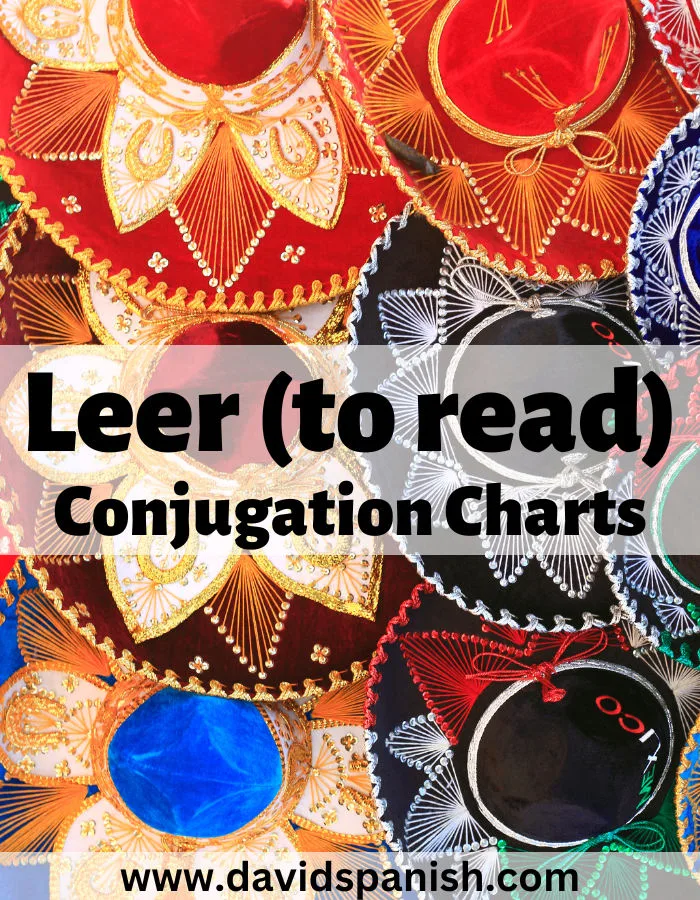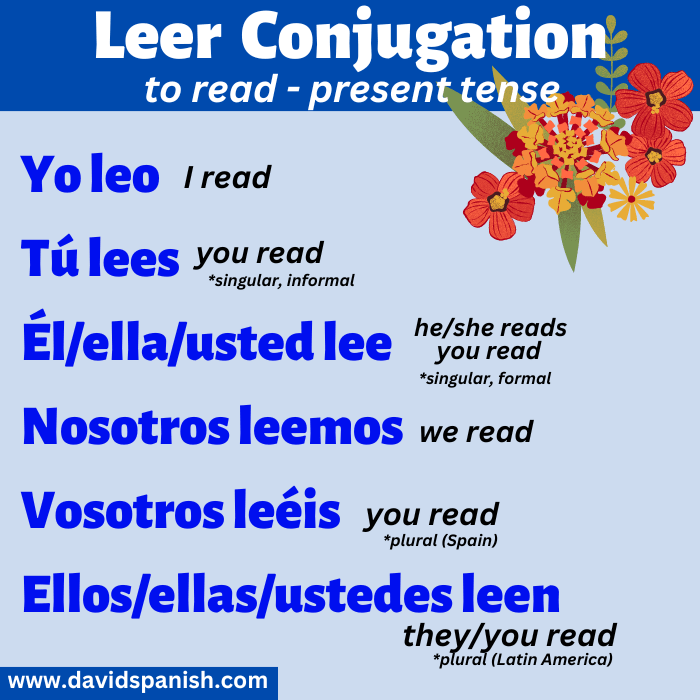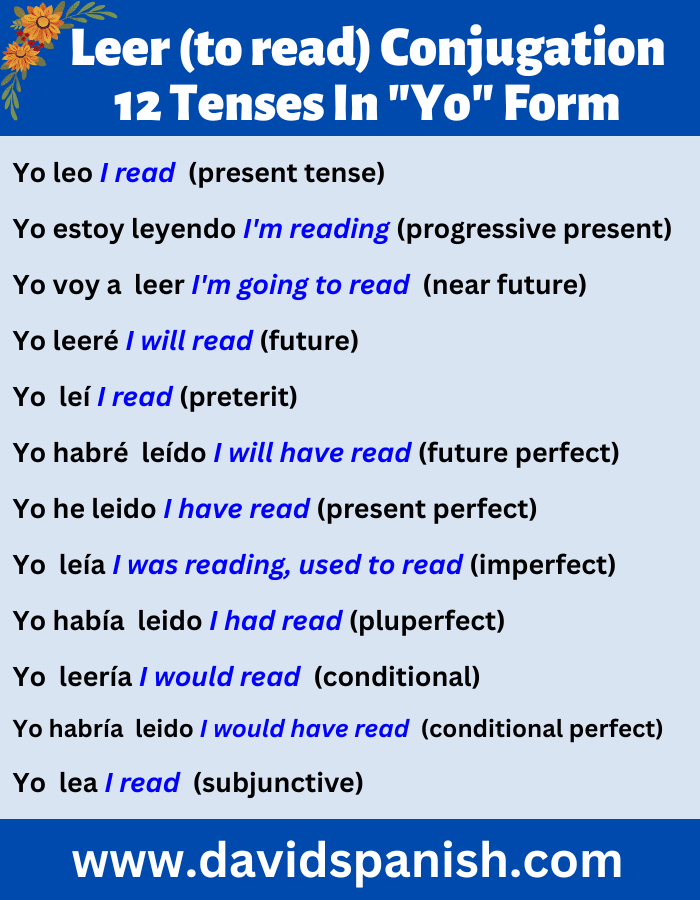Leer (Meaning: to read) is an essential verb for all beginner students in Spanish. The conjugation of leer in the present tense is: Yo leo (I read), tú lees (you read), él/ella, usted lee (he/she reads; you read), nosotros leemos (we read), vosotros leéis (you read), ellos/ellas, ustedes leen (they read).

Leer is a regular ER verb. This means that when conjugated in the present tense, its stem is the same for every subject and its endings are the same as all other regular ER verbs. This page on our site covers regular and irregular Spanish ER verbs in detail.
Leer conjugation in the present tense

Further down the page we provide detailed conjugation charts with example sentences for the following commonly used verb tenses:
- Present tense (present tense)
- Near future (immediate future)
- Future tense (futuro)
- Preterite (pretérito)
- Imperfect (el imperfecto de indicativo)
- Present perfect indicative (perfecto de indicativo)
- Conditional (potential simple)
- Present subjunctive (presente de subjuntivo)
Leer conjugation table

Leer conjugation in a nutshell
The following graphic shows the Spanish verb leer (to read) conjugated in the first-person singular (yo) in twelve tenses.

Leer conjugation charts
Present tense (present tense)
In the present tense, yo leo translates to “I read” and “I am reading”.
| yo leo | I read | Leo las instrucciones. | I read the instructions. |
| tú lees | you read | Tu lees periódicode vez en cuando. | You read the newspaper from time to time. |
| él/ella, usted lee | he/she reads; you read | Ella la chino y japonés. | She reads Chinese and Japanese. |
| nosotros leemos | we read | Leemos la lista de ingredientes. | I read the list of ingredients. |
| vosotros leéis | you read | Vosotros no leéis el libro de texto. | You don't read the textbook. |
| ellos/ellas, ustedes leen | they read | Leen la poesía juntos. | They read poetry together. |
Near future (immediate future)
The near future tense is formed with the following construction: Present tense of ir (to go) + preposition a + infintive.
| yo voy a leer | I'm going to read | Voy a leer una novela. | I'm going to read a novel. |
| tú vas a leer | you're going to read | ¿Vas a leer el plano? | Are you going to read the city map? |
| él/ella, usted va a leer | he/she/you is (are) going to read | Ella va a leer el horóscopo para esta semana. | She's going to read this week's horoscope. |
| nosotros vamos a leer | we're going to read | Vamos a leer una tira cómica. | We're going to read a comic strip. |
| vosotros vais a leer | you're going to read | Vais a leer la reseña de cine. | You're going to read the movie review. |
| ellos/ellas, ustedes van a leer | they/you're going to read | Ellos van a leer los jeroglíficos. | They're going to read the hieroglyphics. |
Future tense (futuro)
In the future tense, yo leeré translates to “I will read”.
| yo leeré | I will read | Yo leeré una novela de Cervantes. | I will read a Cervantes novel. |
| tú leerás | you will read | ¿Leerás la revista? | Will you read the magazine? |
| él/ella, usted leerá | he/she/you will read | Ella leerá el manual de instrucciones. | She will read the instruction book. |
| nosotros leeremos | we will read | Nosotros leeremos su artículo. | We will read your article. |
| nosotros leeréis | you will read | Leeréis el libro de poesía. | You will read the poetry book. |
| ellos/ellas, ustedes leerán | they/you will read | Ellos leerán los caracteres chinos. | They will read the Chinese characters. |
Preterite (pretérito)
The preterite is commonly used Spanish past tense used to describe past actions which occurred at definined times.
| yo leí | I read | Yo no leí la noticias. | I didn't read the news. |
| tú leíste | you read | ¿Leíste mis mensajes? | Did you read my messages? |
| él/ella, usted leyó | he/she/you read | No leyó la etiqueta. | He didn't read the label. |
| nosotros leímos | we read | Leímos los términos y condiciones. | We read the terms and conditions. |
| vosotros leísteis | you read | Leísteis las señales de tráfico. | You read the road signs. |
| ellos/ellas, ustedes leyeron | they/you read | No leyeron mis instrucciones. | They didn't read my instructions. |
Imperfect (el imperfecto de indicativo)
The imperfect tense is used to express past actions which occurred at unspecified times. Yo leía translates to “I used to read”, “I was reading” and “I read”.
| yo leía | I was reading (or used to read, read) | Cuando ere niño leía las historieta. | I used to read comic books when I was a child. |
| tú leías | you were reading | Leías una novela cuando papá llegó. | You were reading a novel when dad arrived. |
| él/ella, usted leía | he/she/you was (were) reading | Ella leía los subtítulos. | She used to read the subtitles. |
| nosotros leíamos | we were reading | Leíamos biblia en la iglesia. | We used to read the bible in church. |
| vosotros leíais | you were reading | Leíais el grafiti en los pardes. | You used to read graffiti on the walls. |
| ellos/ellas, ustedes leían | they/you were reading | Ellos leían el libro de texto cuando entró la profesora. | They were reading the textbook when the professor entered. |
Present perfect indicative (perfecto de indicativo)
The present perfect is used to express past actions which have a bearing on the present. Yo he leido translates to “I have read”.
| yo he leído | I have read | No he leído el periódico hoy. | I have not read the newspaper today. |
| tú has leído | you have read | ¿Has leído las noticias? | Have you read the news? |
| él/ella, usted ha leído | He/she/you has (have) read | Todavía no ha leído el mensaje. | He still hasn't read the message. |
| nosotros hemos leído | we have read | Hemos leído la misma cosa mil veces. | We've read the same thing a thousand times. |
| vosotros habéis leído | you have read | ¿Habéis leído mi nota? | Have you read my note. |
| ellos/ellas, ustedes han leído | they/you have read | Han leído la partitura unas cuantas veces. | They've read the sheet music a few times. |
Conditional (potential simple)
The conditional tense is used for to express hypothetical actions. Yo leería translates to “I would read”.
| yo leería | I would read | Yo leería el periódico pero todas las noticias son malas. | I'd read the newspaper but all the news is bad. |
| tú leerías | you would read | Leerías novelas si tuvieras mâs tiempo. | You'd read novels if you had more time. |
| él/ella, usted leería | he/she/you would read | Él leería las instrucciones si estuviera más paciente. | He'd read the instructions if he were more patient. |
| nosotros leeríamos | we would read | Leeríamos el libro si fuera publicado. | We'd read the book if it were published. |
| vosotros leeríais | you would read | Leeríais francés si conocieran el idioma. | You'd read French if you knew the language. |
| ellos/ellas, ustedes leerían | they/you would read | Leerían mis explicación si fueran más inteligentes. | They'd read my explanations if they were smarter. |
Present subjunctive (presente de subjuntivo)
The subjunctive mood is used to express wishes, emotions and doubts.
| yo lea | I read | Es importante que lea un poco más. | It's important that I read a bit more. |
| tú leas | you read | Dudo que leas esta página. | I doubt you're reading this page. |
| él/ella, usted lea | he/she reads; you read | Es necesario que lea las letras chicas. | It's necessary that he reads the fine print. |
| nosotros leamos | we read | El profesor quiere que leamos une historia. | The professor wants us to read a story. |
| vosotros leáis | you read | Exijo que leáis todas las instrucciones. | I require that you read all the instructions. |
| ellos/ellas, ustedes lean | they/you read | Es importante que lean la biografía. | It's important that they read the biography. |
Discover more:
- Ser (to be) conjugation
- Estar (to be) conjugation
- Tener (to have) conjugation
- Poder (can, to be able) conjugation
- Hablar (to speak) conjugation
- La Bamba Meaning, Spanish Lyrics & English Translation - May 4, 2024
- Bésame Mucho Meaning, Spanish Lyrics & English Translation - May 3, 2024
- Querida – Lyrics, Meaning & Translation - May 2, 2024
